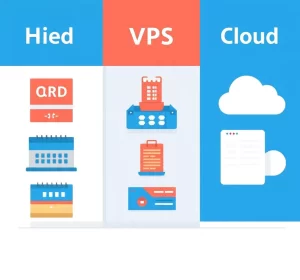The Hosting Landscape: Navigating Web Hosting Options
Navigating the complexities of web hosting services; understanding the operational framework of web hosting service providers
How Do Web Hosting Service Provider Companies Work?
A Complete Guide
Small business owners, entrepreneurs, students, and anyone curious about web hosting and how hosting companies operate.
Have you ever wondered what happens behind the scenes when you type a website address and it instantly loads on your screen? The answer lies in the world of navigating the complexities of web hosting services. These companies ensure websites are stored, managed, and accessible 24/7 from anywhere in the world.
In this guide, we’ll explore how web hosting works, what providers actually do, and why choosing the right hosting service is crucial for your online success.
What Is Web Hosting and Why Is It Important?
Web hosting is the process of storing website files (like text, images, and code) on servers that are connected to the internet. When someone visits your domain name, their browser retrieves these files from the server and displays your website.
Examining the Spectrum of Web Hosting Solutions; without web hosting, your site wouldn’t exist online—it would simply sit on your computer. Hosting providers make sure your site is:
- Always available online
- Secure from cyber threats
- Fast and optimized for visitors
The Role of Web Hosting Service Provider Companies
Hosting providers play multiple roles beyond just storing your files.
Storage and Servers
They allocate space on powerful servers where your website files and databases are stored.
Bandwidth and Data Transfer
They ensure smooth delivery of your site’s data to users worldwide without interruptions.
Security and Backups
Providers offer firewalls, malware protection, SSL certificates, and regular backups.
Customer Support and Uptime
Top providers guarantee 99.9% uptime with responsive support teams.
How Web Hosting Companies Work Behind the Scenes?
Data Centers and Infrastructure
Web hosting providers operate massive data centers with redundant power, cooling systems, and high-speed connections.
Server Management and Maintenance
Technicians constantly monitor servers, apply updates, and replace faulty hardware to prevent downtime.
Domain and DNS Integration
They manage DNS settings so that when someone types your domain, the request is routed to the correct server.
Different Types of Web Hosting Explained

Shared Hosting
Multiple websites share the same server. Cost-effective but limited in performance.
VPS (Virtual Private Server) Hosting
Your website runs in a dedicated partition of a server, offering more resources and control.
Dedicated Hosting
A whole server dedicated to your site—ideal for large businesses or high-traffic websites.
Cloud Hosting
Websites are hosted on multiple servers simultaneously, ensuring flexibility and reliability.
How Web Hosting Companies Make Money?
Subscription Plans and Packages
Most providers charge monthly or yearly subscription fees based on storage, bandwidth, and features.
Add-On Services (SSL, Email, Security)
They upsell extra services like domain registration, premium support, advanced security, and business email hosting.
Choosing the Right Web Hosting Provider
Performance and Reliability
Look for companies with high uptime guarantees and fast load times.
Scalability and Pricing
Choose providers that allow you to upgrade easily as your business grows.
Support and User Experience
Quality support (live chat, phone, email) is crucial when technical issues arise.

Common Misconceptions About Web Hosting Companies
• All hosting is the same
False—different hosting types suit different needs.
• Free hosting is enough
Free plans often lack security, speed, and support.
• Once I choose a host, I can’t switch
You can always migrate to a better host.
Future Trends in Web Hosting Services
Green Hosting and Sustainability
Eco-friendly hosting powered by renewable energy is becoming a priority.
AI-Powered Hosting and Automation
Artificial intelligence is helping automate server monitoring and threat detection.
Edge Computing and Faster Delivery
Edge servers bring content closer to users, improving speed and reducing latency.
Conclusion
- Web hosting providers make websites accessible online 24/7.
- They handle servers, bandwidth, security, and support.
- Hosting comes in different types: shared, VPS, dedicated, and cloud.
- Providers make money through subscriptions and add-on services.
- The future of hosting includes green hosting, AI automation, and edge computing.
<< Final Thought >>
Web hosting companies form the backbone of the internet. Without them, websites wouldn’t exist online. Whether you’re launching a personal blog or running a business, understanding navigating the complexities of web hosting services helps you choose the right partner for your online journey.
Ready to start? Compare providers, evaluate your needs, and pick the right hosting plan to bring your website to life.
FAQs
What does a web hosting company actually do?
They store your website files, manage servers, and ensure your site stays online securely.
Do I need to buy a domain and hosting separately?
Not always. Many providers bundle domains and hosting in one package.
What’s the difference between shared and cloud hosting?
Shared hosting uses one server for many sites, while cloud hosting uses multiple servers for better reliability.
How much does web hosting cost?
Costs range from $3–$20 per month for shared hosting, up to hundreds for dedicated hosting.
Can I switch hosting providers later?
Yes. Most companies offer migration services to help transfer your site.
For more navigating the complexities of web hosting services >> >> >> Web Hosting Service










